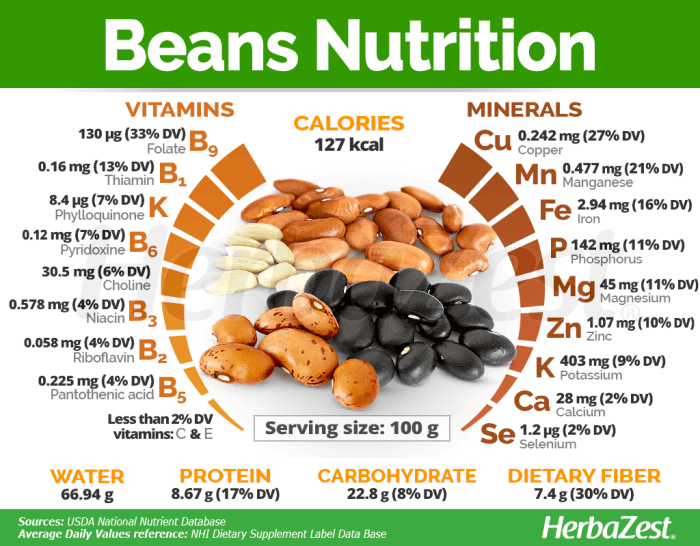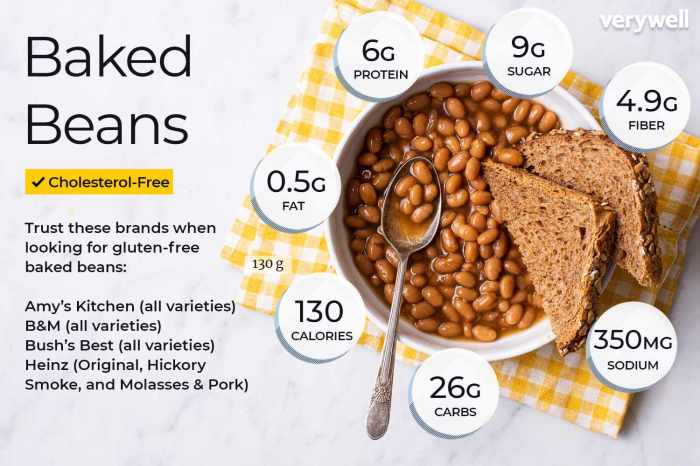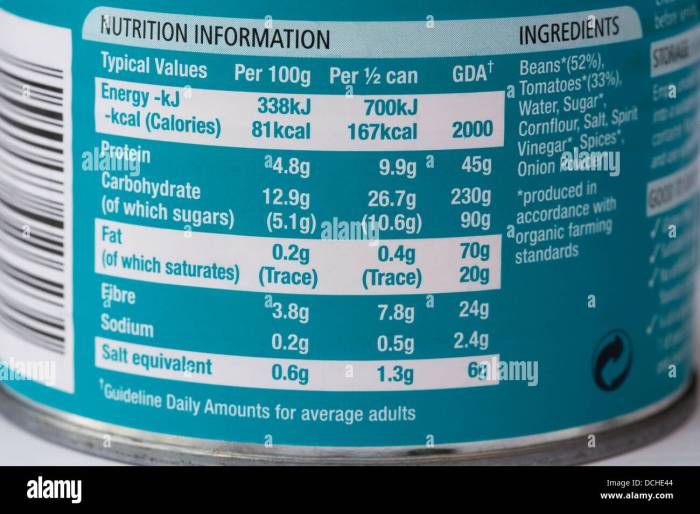Nutritional Composition of Baked Beans

Baked beans nutrition facts – Baked beans, a culinary staple enjoyed worldwide, offer a surprisingly diverse nutritional profile beyond their delicious taste. They’re a fantastic source of both macronutrients and micronutrients, contributing significantly to a balanced diet. Let’s delve into the specifics of what makes these humble beans so nutritionally rewarding.
Macronutrient Breakdown in Baked Beans
A typical one-cup serving of baked beans provides a balanced mix of carbohydrates, protein, and fat. The carbohydrate content is predominantly from complex carbohydrates, offering sustained energy release rather than a rapid blood sugar spike. This makes them a preferable choice compared to refined carbohydrates. The protein content contributes to satiety and muscle building, while the fat content is relatively low and mostly unsaturated, contributing to heart health.
Furthermore, baked beans are exceptionally rich in dietary fiber, which aids in digestion and promotes gut health. A precise breakdown will vary slightly depending on the recipe and ingredients used, but generally, a one-cup serving contains approximately 40-45 grams of carbohydrates (including 10-15 grams of fiber), 7-10 grams of protein, and 1-2 grams of fat.
Micronutrient Profile of Baked Beans
Beyond the macronutrients, baked beans are packed with essential vitamins and minerals that play crucial roles in various bodily functions. The table below showcases the impressive micronutrient profile of a typical serving. Remember that the exact amounts may vary depending on factors like bean variety and preparation methods.
| Name | Amount per serving (1 cup) | % Daily Value | Health Benefit |
|---|---|---|---|
| Iron | ~3mg | ~17% | Essential for oxygen transport and red blood cell production. |
| Folate | ~100mcg | ~25% | Crucial for cell growth and development, especially important during pregnancy. |
| Potassium | ~500mg | ~11% | Supports healthy blood pressure and muscle function. |
| Magnesium | ~60mg | ~15% | Contributes to bone health, muscle and nerve function. |
| Manganese | ~1mg | ~50% | Important for metabolism and wound healing. |
| Zinc | ~1mg | ~7% | Supports immune function and cell growth. |
Glycemic Index and Glycemic Load of Baked Beans
The glycemic index (GI) and glycemic load (GL) are valuable metrics for assessing how a food impacts blood sugar levels. Baked beans possess a relatively low to moderate GI, typically ranging from 30-40, meaning they cause a gradual rise in blood sugar compared to high-GI foods. Their glycemic load is also moderate, considering both the GI and the carbohydrate content.
This moderate GI and GL makes baked beans a suitable choice for individuals managing their blood sugar levels, although portion control is always recommended. For example, a small portion of baked beans might be better tolerated than a large one for those with diabetes or insulin resistance. This makes baked beans a more balanced and healthy option compared to foods with high GI values, such as white bread or sugary drinks.
So you’re checking out baked beans nutrition facts? Good for you! Knowing your macros is key, whether it’s for a healthy home-cooked meal or a restaurant outing. If you’re curious about the caloric impact of a Texas Roadhouse feast, though, check out the comprehensive nutritional information available at texas roadhouse nutrition facts to compare and contrast.
Then, you can confidently make informed choices about your baked beans and your next big steakhouse adventure!
Baked Beans and Health Benefits: Baked Beans Nutrition Facts

Baked beans, those humble legumes simmered in a sweet and savory sauce, offer a surprisingly robust nutritional profile that translates to significant health advantages. Far from being just a comforting side dish, they contribute meaningfully to digestive well-being, heart health, and overall vitality. Let’s explore the remarkable ways these little beans can benefit your body.
Digestive Health: Fiber and Prebiotics
Baked beans are an excellent source of dietary fiber, a crucial component for a healthy digestive system. This fiber, both soluble and insoluble, works in tandem to promote regularity, preventing constipation and supporting healthy bowel movements. The insoluble fiber adds bulk to the stool, making it easier to pass, while the soluble fiber absorbs water, creating a softer, more manageable consistency.
Beyond simple regularity, baked beans contain prebiotics, which are essentially food for the beneficial bacteria residing in your gut. These “good” bacteria play a vital role in maintaining a balanced gut microbiome, crucial for overall digestive health and even impacting immunity. A healthy gut microbiome is associated with reduced risk of various digestive issues, including irritable bowel syndrome (IBS) and inflammatory bowel disease (IBD).
Consuming baked beans regularly can help cultivate this thriving environment within your gut.
Heart Health: Fiber, Potassium, and Antioxidants
The heart-healthy benefits of baked beans are multifaceted. The high fiber content helps lower LDL (“bad”) cholesterol levels, a key factor in reducing the risk of heart disease. Fiber binds to cholesterol in the digestive tract, preventing its absorption into the bloodstream. Baked beans are also a good source of potassium, an essential mineral that helps regulate blood pressure.
Maintaining healthy blood pressure is critical for preventing cardiovascular diseases such as stroke and heart attack. Furthermore, baked beans contain antioxidants, which combat oxidative stress – a process linked to damage to cells and tissues, including those in the heart. These antioxidants help protect against the damaging effects of free radicals, reducing the risk of cardiovascular complications. Studies have shown a correlation between higher fiber intake and a lower risk of heart disease, making baked beans a valuable addition to a heart-healthy diet.
Other Health Benefits, Baked beans nutrition facts
Beyond digestive and heart health, baked beans offer other potential benefits. Their moderate protein content contributes to feelings of fullness and satiety, which can aid in weight management. They provide a sustained release of energy, preventing those mid-afternoon slumps. Furthermore, the complex carbohydrates in baked beans are digested slowly, leading to a more gradual rise in blood sugar levels compared to refined carbohydrates.
This can help improve blood sugar control, particularly beneficial for individuals with diabetes or those at risk of developing the condition. The combination of fiber, protein, and complex carbohydrates makes baked beans a satisfying and nutritious food that can support overall well-being and contribute to a healthier lifestyle.
Baked Beans and Health Concerns

While baked beans offer a wealth of nutritional benefits, it’s crucial to acknowledge potential drawbacks associated with their consumption. Understanding these concerns allows for informed choices and mindful enjoyment of this versatile legume. Moderation, as with most foods, is key to reaping the rewards without experiencing any negative consequences.
Baked beans, particularly canned varieties, often contain a significant amount of sodium. High sodium intake is linked to increased blood pressure and a heightened risk of cardiovascular diseases. Furthermore, the interaction between certain medications and the components of baked beans can sometimes be problematic. For instance, individuals taking medications for blood pressure or kidney function should monitor their baked bean consumption closely, as the high potassium content in some beans could potentially interfere with these medications.
Always consult your doctor or pharmacist if you have concerns about the interaction of baked beans with your medication regimen.
Nutritional Profile Comparison: Canned vs. Homemade Baked Beans
A direct comparison between canned and homemade baked beans reveals key differences impacting their overall health profile. Canned baked beans frequently contain added sugar, salt, and preservatives to enhance taste and shelf life. These additions significantly increase the sodium and sugar content, potentially offsetting some of the health benefits. Homemade baked beans, on the other hand, offer greater control over ingredients, allowing for the reduction or elimination of added sugars and salts.
This translates to a lower sodium and sugar intake, along with a potentially higher fiber content depending on the beans used and the preparation method. The absence of preservatives is another significant advantage of homemade beans. While canned beans offer convenience, the nutritional superiority of homemade baked beans, prepared with fresh ingredients and minimal added sodium and sugar, is undeniable.
Potential Health Risks of Excessive Baked Bean Consumption
While baked beans are generally healthy, excessive consumption can lead to several potential health issues. It’s important to remember that moderation is key to maximizing the benefits while minimizing any potential risks.
- High Sodium Intake: Excessive consumption can contribute to high blood pressure and related cardiovascular problems.
- Gas and Bloating: The high fiber content, while beneficial in moderation, can cause digestive discomfort, including gas and bloating, in some individuals if consumed in large quantities.
- Medication Interactions: As mentioned earlier, the potassium content in baked beans can interfere with certain medications, particularly those for blood pressure or kidney function.
- Sugar Intake (Canned Beans): The added sugars in many canned varieties can contribute to weight gain and other health issues associated with high sugar intake.
- Phytic Acid Content: Phytic acid, an antinutrient found in beans, can hinder the absorption of certain minerals like iron and zinc. However, soaking and sprouting beans can reduce phytic acid levels.
FAQ Resource
Are all baked beans created equal?
No. Nutritional content varies depending on the brand, ingredients (added sugar, sodium), and preparation method (canned vs. homemade). Homemade baked beans generally offer more control over sodium and added sugar.
Can I eat baked beans every day?
While baked beans are nutritious, daily consumption might lead to excessive intake of certain nutrients or compounds. Variety in your diet is key. Moderation is recommended.
Are baked beans good for weight loss?
Baked beans can be part of a weight-management plan due to their high fiber content, promoting satiety. However, portion control is crucial, and the overall calorie intake should be considered.
Do baked beans cause gas?
The high fiber content in baked beans can cause gas in some individuals. Introducing them gradually into your diet can help your body adjust.
